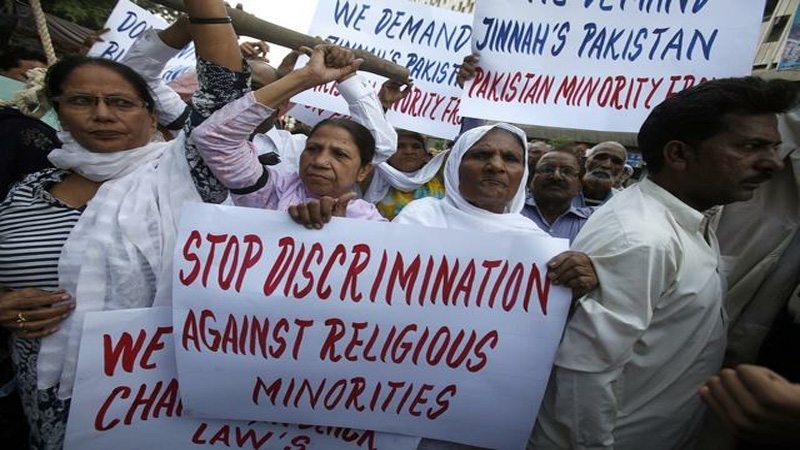Pakistan being placed on the US’s watch list for “severe violations of religious freedom” but this has been rejected by Pakistan as “politically motivated and not based on the objective criteria”.
Unfortunately, the move is right but the timing is wrong as it has come after US president Donald Trump’s tweet and following a war of words that has created a tumultuous relationship between the two countries.
Pakistan’s reaction was expected as it is the same rhetoric that has been adopted in the past. Prime Minister Shahid Khaqan Abbasi referring to Quaid-e-Azam’s 11th August speech said that Pakistan is for all no matter what religion you belong to and that Pakistan’s constitution guarantees equal rights to minorities.
Some minority leaders have welcomed the move,and others have rejected it, but the truth is that the situation for minorities in Pakistan is appalling.
Although this is the first time Pakistan has been placed on the watch list under the international Religious Freedom Act (IRFA) of 2016 created by US senator Frank R Wolf, we all know that the US commission on International Religious Freedom (USCIRF) has been recommending to the US State Department that Pakistan should be listed as a Country of Particular Concern (CPC) — by some estimates since 2002, and Pakistan continues ignoring minorities’ issues and issues of ongoing violation of freedom of religion.
Pakistan Human Rights Commission (HRCP) said attacks on religious minorities and sects, particularly on their places of worship, have increased across the country. In its response to such attacks, the government has continued to look at symptoms alone and the root cause has been ignored.
In 2015 the commission said that Pakistan is one of the worst countries in the world for religious freedom while HRCP’s Secretary General, Mr IA Rehman, at the launch of the commission’s annual report in 2014 said Pakistan has become “a more and more dangerous country” for religious minorities.
The situation of minorities is now an open secret, any statement even from minority leaders or rejection from Pakistani politicians or the government cannot change reality.
If Pakistan cannot take its inclusion on the watch list seriously, then it should at least take it as a prompt to start moving things in the right direction not to appease any country or avoid possible sanctions, but to safeguard the rights of its own people.
 It is not just the USCIRF, but Pakistan’s own civil society and several other countries and international organisations that have been voicing their concerns over the same issues for years. Instead of facing the reality, Pakistan has been making excuses to the international community instead of taking measures to bring changes.
It is not just the USCIRF, but Pakistan’s own civil society and several other countries and international organisations that have been voicing their concerns over the same issues for years. Instead of facing the reality, Pakistan has been making excuses to the international community instead of taking measures to bring changes.
I believe now is the time for Pakistan to take this mater seriously and react wisely. It may be that the US is firing over the shoulder of our minorities to target Pakistan, but it is not just the USCIRF alone. This action from the USCIRF was expected and though it has been avoided for the last several years for being a vital ally in the war against terror, the new US president is very unpredictable and has changed its policy so there are some chances.
I think that instead of criticising the US State Department, we should focus on resolving our issues and putting our house in order as the former prime minister, Mian Nawaz Sharif said after his visit to Saudi Arabia.
He also said that that the day is not far when Pakistan will be recognised as a “minorities-friendly country”. Even Foreign minister Khawaja Asif said the same thing about putting our house in order and if I am not wrong former Chief of Army Staff — General Ashfaq Parvez Kayani expressed the same sentiment.
Though we are making new alliances with countries like China and Russia, we should be cognizant of their human rights records which are far from ideal. Pakistan is the country that takes the most aids from the UK, Canada, Japan, Germany and Austria amongst others.
On December 29, the European Union and Pakistan signed a Euro 9.6 million Grant Financing Agreement on Promotion of Human Rights in Pakistan.
We shouldn’t forget that the main reason for denying us status of Generalised System of Preference (GSP) Plus was our human rights record and when Pakistan was granted a status of GSP Plus it was not that we improved the situation of human rights or that we had lobbied very strongly or a fall in the criteria, it was given to Pakistan simply on the basis of an all or nothing formula.
If Pakistan cannot take its inclusion on the US watch list seriously, then it should at least take it as a prompt to start moving things in the right direction. Not to appease any country or avoid possible sanctions, but to safeguard the rights of its own people
In this package, there were many countries that the European Parliament really wants to support, such as Moldova and Georgia, so it was easily approved but many EU parliamentarians believed the Pakistani human rights situation was at its worst and did not fulfil the requirements of a host of international human rights conventions it has signed. Pakistan had signed 27 international conventions at that time and was under obligation to bring its law in line with these treaties. The European Union had warned that facilities given to the Pakistan can be taken back but it made no difference. I am not sure if our politicians are doing it obliviously, or if they are ignoring it purposely. Either way can be very costly, especially for our economy.
The GSP plus status was granted to Pakistan in 2014 which is now due for its renewal and keeping in view the present situation and Pakistan’s human rights record, it is going to be difficult for Pakistan as it has failed to comply with the UN conventions ratified to get GSP Plus status.
If Pakistan loses this status the politicians are to be blamed, not the minorities nor the US. Though Pakistan has already began lobbying the EU member’s states and individual MEPs to avoid any hindrances for the renewal, at the same time several countries and groups in the European Parliament like intergroup on Religious Freedom or Belief are already opposing renewal.
I think we should take the US’s move positively and focus on the upcoming renewal of GSP Plus status. We should give some priority to issues like freedom of religion of belief, promote religious tolerance, stop growing religious hatred against minorities and address the issues like forced conversion, misuse of the blasphemy law, discriminatory job advertisements, and a school and college curriculum which promotes hatred against religious minorities. I don’t think the government is unaware of these issues or of the concerns of international community, and resolving these is not beyond the means of the government or politicians. The only thing lacking is political will.
The writer is a freelance columnist
Published in Daily Times, January 11th 2018.
